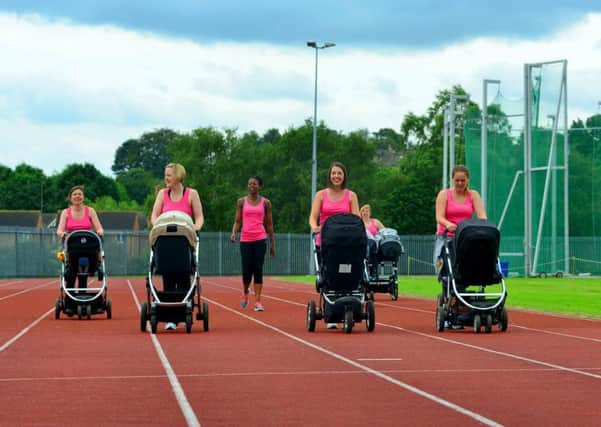Getting active for a better life


But results from a 12-year-long study, reported this month by the BBC, may give people extra reason to start taking more exercise.
Researchers at the University of Cambridge found that inactivity could be killing twice as many people in Europe as obesity.
Advertisement
Hide AdAdvertisement
Hide AdAbout 676,000 deaths each year were found to be down to a lack of exercise – compared with 337,000 from carrying too much weight.
The study, first published in the American Journal of Clinical Nutrition, also found thin people have a higher risk of health issues if they live a sedentary life. And those who are obese who do exercise still have better health than those who do not.
The study suggested at least 20 minutes of brisk walking a day would have substantial benefits to health.
Kirklees Joint Strategic Needs Assessment (JSNA) studies on physical activity carried out by Current Living in Kirklees 2012-13 outline some of our district’s statistics on exercise.
Advertisement
Hide AdAdvertisement
Hide AdOnly one in three adults do the recommended level of 30 minutes of physical activity more than five times a week – but that is up 28 per cent from one in four in 2005.
One in 10 adults never do 30 minutes or more of moderate activity in an average week.
This was lower amongst women, those of lower in income and people of south Asian origin.
One in eight – 13 per cent – of 14-year-olds did less than 30 minutes activity each day.
Advertisement
Hide AdAdvertisement
Hide AdAnd those who did not meet recommended levels were more likely to be from Batley, Dewsbury, the Spen Valley, and Huddersfield.
A major issue was that many people thought physical activity was an “add-on”, whereas it should be a crucial part of daily life.
But while nearly half of all adults were described as being sedentary – an “alarmingly high” level according to one of the reports – more than half also wanted to do more sport and active recreation.
Coun Viv Kendrick, chairwoman of Kirklees’ Health and Wellbeing Board, thinks generational change has impacted on healthy lifestyles.
Advertisement
Hide AdAdvertisement
Hide Ad“Modern life is a huge deterrent to us taking part in these things,” she said.
“People nowadays have busy lives. You’re going home and thinking ‘Am I going to go to the gym? I actually just want to go home and collapse.’
“If you’ve got commitments, it’s really hard to get up and out. The pressure of busy lives is one thing that gets in the way.
“My mother didn’t have a vacuum cleaner and didn’t have a washing machine. Women then in the home were very, very physically active.
Advertisement
Hide AdAdvertisement
Hide Ad“People travelled on public transport and walked much more then. A lot of us have also become reliant on driving everywhere rather than doing a bit of walking.
Another common argument for inactive lifestyles is that workplaces are more sedentary.
But Coun Kendrick (Lab, Heckmondwike) – a founder member of the Pennine Canoe Club – does not believe that there is necessarily a link between good health and paid physical work.
“I’ve been around a long time and I know people who worked in these industries and by the time they were in their 50s, their bodies had packed-up,” she said.
Advertisement
Hide AdAdvertisement
Hide AdCoun Kendrick thinks joining independent sports and social groups is a good way to encourage those who are put off by exercise.
She gives the example of the Heckmondwike Petanque Club, of which she is a member.
It started about three years ago and quickly attracted more than 50 participants of wide-ranging age. If you have a passion in doing something, you go out of your way to do it,” she said.
“And if you are going with someone, a friend or relative, you are much more inclined to go and take part.
Advertisement
Hide AdAdvertisement
Hide Ad“As you are flagging, they’re maybe saying ‘Come on!’ So you get that personal encouragement.”
The Current Living in Kirklees report stated that a common problem amongst those who were inactive was “having nobody to go with, particularly when starting or returning to physical activity after a break.”
The Public Health study said more needed to be done about activity levels of women of child-bearing age. This stood at one in three, with the lowest levels in Birstall and Birkenshaw (31 per cent).
One exercise club which may appeal to this group is Buggymovers, based at Spenborough Pool and Sports Complex in Bradford Road, Liversedge.
Advertisement
Hide AdAdvertisement
Hide AdIt was started by Julie Settle of Hollingbank Lane, Heckmondwike.
It offers new mums a baby-friendly session at the facility – where they jog around the track with their prams. They also do simple exercises to tone and strengthen the body.
Grandmother-of-two Julie, 52, said: “It’s very social. Afterwards I put the kettle on and everyone brings something in – this week we had muffins! People stay until they’ve got to go pick the siblings up from school.
“I think it also helps mums with post-natal depression. One mother feels like she’s made a whole lot of friends. If they don’t know another mum, they can become quite isolated.”
Julie currently hosts seven to eight mums, but is hoping to bring in around 14 to the sessions on Fridays at 1.30pm.
Visit Buggymovers on Facebook for information on the group.